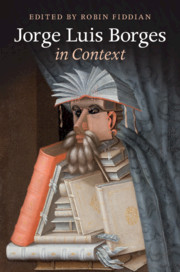Book contents
- Jorge Luis Borges in Context
- Jorge Luis Borges in Context
- Copyright page
- Contents
- Illustrations
- Contributors
- Acknowledgements
- Permissions
- Note on Primary Sources and Editions Used
- Chronology
- Note on Translations and Abbreviations
- Introduction Borges in Context, Context in Borges
- Part I Self, Family, and the Argentine Nation
- Chapter 1 Borges and the Question of Argentine Identity
- Chapter 2 Borges and the Banda Oriental
- Chapter 3 Borges in Person: Family, Love, and Sex
- Chapter 4 Jorge Luis Borges’s Fictions and the Two World Wars
- Chapter 5 Dictatorship and Writing (1976–1983)
- Chapter 6 The Public Author and Democracy (1984–1986)
- Chapter 7 Borges and Las Islas Malvinas
- Chapter 8 Borges and Sarmiento
- Chapter 9 Borges and the Gauchesque
- Chapter 10 1920s Buenos Aires
- Chapter 11 Borges and the Argentine Avant-Garde
- Chapter 12 The Argentine Writer and Tradition
- Chapter 13 Borges, Tangos, and Milongas
- Chapter 14 Borges and Bioy Casares
- Chapter 15 Borges and Popular Culture
- Chapter 16 Argentine Responses: César Aira and Ricardo Piglia
- Part II The Western Canon, the East, Contexts of Reception
- Further Reading
- Index
Chapter 1 - Borges and the Question of Argentine Identity
from Part I - Self, Family, and the Argentine Nation
Published online by Cambridge University Press: 16 January 2020
- Jorge Luis Borges in Context
- Jorge Luis Borges in Context
- Copyright page
- Contents
- Illustrations
- Contributors
- Acknowledgements
- Permissions
- Note on Primary Sources and Editions Used
- Chronology
- Note on Translations and Abbreviations
- Introduction Borges in Context, Context in Borges
- Part I Self, Family, and the Argentine Nation
- Chapter 1 Borges and the Question of Argentine Identity
- Chapter 2 Borges and the Banda Oriental
- Chapter 3 Borges in Person: Family, Love, and Sex
- Chapter 4 Jorge Luis Borges’s Fictions and the Two World Wars
- Chapter 5 Dictatorship and Writing (1976–1983)
- Chapter 6 The Public Author and Democracy (1984–1986)
- Chapter 7 Borges and Las Islas Malvinas
- Chapter 8 Borges and Sarmiento
- Chapter 9 Borges and the Gauchesque
- Chapter 10 1920s Buenos Aires
- Chapter 11 Borges and the Argentine Avant-Garde
- Chapter 12 The Argentine Writer and Tradition
- Chapter 13 Borges, Tangos, and Milongas
- Chapter 14 Borges and Bioy Casares
- Chapter 15 Borges and Popular Culture
- Chapter 16 Argentine Responses: César Aira and Ricardo Piglia
- Part II The Western Canon, the East, Contexts of Reception
- Further Reading
- Index
Summary
Throughout his life, Borges was concerned with the identity of his nation. The model of the gaucho from nineteenth century letters was replaced by faith in the criollos, who Borges in the 1920s believed should join forces with immigrants to create a democratic and progressive model for the nation. In the 1940s and 1950s, Borges took up a position against right-wing nationalists including General Perón. Later, after he had declared support for the military coup of 1976, Borges acknowledged his mistake and expressed a utopian vision of a world modelled on the Swiss Confederation.
- Type
- Chapter
- Information
- Jorge Luis Borges in Context , pp. 11 - 17Publisher: Cambridge University PressPrint publication year: 2020

